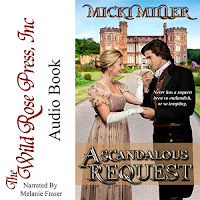 A Scandalous Request by Micki Miller.
A Scandalous Request by Micki Miller.My rating: 3 of 5 stars ⭐⭐⭐
Duration: 7 hrs 53 mins.
#BennetSistersScale: Jane - 🌹🌹🌹🌹 Defined by its sweetness and simpering, fairytale style, this book had to be a Jane.
Summary: A Scandalous Request by Micki Miller is a Regency romance set against a background of scandal and intrigue. After fleeing her lecherous Brother-in-Law Rose finds solace in a marriage of convenience, but a proposition from her new husband and the enigmatic Earl of Blackwood throws Rose’s world into turmoil and changes all their lives in ways they could never have predicted.
I have to begin by saying that I have very conflicting feelings about this book. There are parts I really enjoyed, but it has also broken the record for the number of times I have spoken back to, and occasionally shouted at, an audiobook.
A Scandalous Request is shamelessly sweet, with a sing-song, fairy-tale expression, and the writing style is very flowery. I am not one who practices any economy with words, as anyone who has read my previous blogs can attest. Yet it felt at times as though the author’s main editing process involved combing back through her manuscript with a thesaurus, swapping perfectly serviceable words with their more grandiloquent counterparts to make each sentence as ‘pretty’ as possible. The florid style gave this Regency romance a very old-fashioned feel which had nothing to do with the historical setting. It reminded me of the 70s/80s Mills & Boon paperbacks which lined shelf upon shelf of every charity shop I visited as a child. Whilst I have never read a book by Dame Barbara Cartland, this audiobook feels the way I always imagined her novels might whenever I saw her dressed head-to-toe in shades of pink, which managed to clash rather violently with the varying candyfloss hues of her home décor.
The plot itself is not a bad one, and I felt an instant affinity to several of the characters. Burke Darington, in particular, is a fine rake and I would have enjoyed having his perspective and development explored in more detail. He was, without question, my favourite character in the book, but I do have a marked fondness for confirmed bachelors who come undone at the feet of women who appear, at first, not quite exotic enough to tempt them. (Thank you, Mr Darcy.)
I was also pleased to see a healthy homosexual relationship portrayed with tolerance by those close to the couple, despite the period setting and the dangers of conducting such a love-affair at the time. It was a little unfortunate that so many stereotypes came into play here, with the main clues to this ‘plot twist’ coming in the form of a gentleman’s inimitable taste in interior design and numerous platonic female friendships. It was refreshing to see the men’s relationship depicted as happy and loving, because the inclusion of homosexual relationships in historical romances is often blighted by torturous self-flagellation or unyielding tragedy. I was, therefore, rather disappointed in the conclusion of this storyline, as it fell into the trap of a rather unfortunate trope. ( I will refrain from going into any more detail so as not to ruin the story for anyone wanting to listen for themselves, but be aware that the link to the article about the history of gay characters in the media contains a spoiler, though not one specific to the book.)
The character with whom I felt the least connection, and the greatest frustration, was the protagonist, Rose. From almost the first moment of her introduction it was clear that she was a Mary Sue of such flawless perfection that she’d make Mary Poppins appear delinquent. Her innocence drives men wild with longing, she is beloved by all but one of her servants, and near the beginning of the book the youthful, blonde, kind-natured, ingenue is literally described as being adored by orphaned children and stray puppies alike. Not a chapter passes without her doing something “adorable” or the sun pitching on her in just the right way to emphasise her angelic beauty. This tendency, and the effusive nature of the writing, is nicely summarised by this quote. As Rose enthuses over a butterfly, Lord Darington muses:
"It was Rose who brimmed his vision. She looked adorable with her graceful hands clasped before her, a smile of fascinated admiration lighting her face all the way to her sapphire eyes. Sunlight caressed her candescent skin and touched her golden hair, envious, without doubt. The glowing effect encompassed all of her, like a celestial corona. It was an effort to wrench his gaze away."
In isolation it may sound romantic, but Rose’s attributes are espoused so frequently that the only surprise is that any mortal man can look upon her for long enough to notice them before bursting into flames. Fortunately, we are reminded by the defiant tilt of her chin that Rose is ‘spirited’, which in Regency London is an adjective reserved for women with some personality. Much of Rose’s spirit appears as an uncanny ability to wield an amber pig with devastating accuracy, an element of the story which I actually thought was great fun and made me wish the author had embraced a little more humour.
A Scandalous Request is a mainly sweet romance with a little intimacy, mainly detailed from Rose’s perspective without delving into her lover’s experience, but it was not explored very explicitly. I felt that the book needed either to include the sex-scenes properly or leave them out, instead of the rather unsatisfying half-and-half approach which begins to build some heat between the characters and then skims over the surface of their actions, as if the author has lost confidence in it. Intimacy of this kind can be excruciating to write if one is embarrassed by the prospect, and I think that it may have suited both the author and the characters if the book had drawn out their courtship instead of treating them to a few lacklustre romps. It would also have solved another issue, namely the etymology of the various intimacies.
In one post-coital moment, the Earl refers to his paramour, Pru, and their “night of sex”. According to Etymology Online, ‘sex’ wasn't used as shorthand for sexual intercourse until 1929, by D H Lawrence. (No relation.) Regency language has many colourful phrases a rake might use when contemplating his lover and it was shame that such a modern one was used instead. When 'made love' was used later in the book, equally as erroneously, it didn't rankle as much as it usually would because it was, at least, less jarring than the previous choice.
I feel as though I am being unfairly critical because there was certainly a compelling story buried under the sacchariferous styling. (For example, a character becoming wrongly imprisoned in Newgate was an engaging turn of events, but the lady in question ended the worst day of her life dreaming of “fairy lands, and family, and love”. Which was one of the moments when I shouted at it for ruining the first occasion where she begins to develop some dimension beyond that of a Disney princess.) I feel, as I seem to with many a romance novel these days, that this book would have benefited significantly from a critique group who could have helped the author embrace her talent for plot while preventing her from hiding it behind stereotypes and cloying descriptions. There’s a good book in here somewhere, but it is currently not quite fulfilling its potential, which often made it frustrating to listen to.
The narrator, Melanie Fraser, did an excellent job of infusing the story with life and performs each of the parts very well. She does read it a little like it is a bedtime story, so I mainly listened to it in the evening when winding down. I think that this particular audiobook would have been better with a male narrator, as it may have helped alleviate some of the cloying sweetness, especially given the prominence of the male characters. Fraser’s voice for Rose made her sound incredibly young but was very expressive. I would love to listen to Melanie Fraser narrating children’s books, as I think she would be wonderful reading something like Enid Blyton. She has a storyteller’s style, and whilst in this case it exacerbated the fairy-tale feeling of the book, I think that it would be perfect in a book for a younger audience.
I wasn’t keen on the echoey sound effects used during the scenes at Newgate Prison. No sound effects were used anywhere else – not even the thwack of amber upon chauvinist – so it seemed very out of place. Had it been part of a dramatised recording with other atmospheric sounds then it would have been fine, but in their absence it felt like a gimmick. This is personal preference, however, as I can imagine others finding it immersive.
Overall, A Scandalous Request is a sweet Regency romance with its heart in the right place, and if you are happy to lose yourself in the period and experience it alongside a young woman with similarly benevolent intentions then you may well enjoy this audiobook. However, if you prefer your historical heroines to feel a little more rounded in places other than merely the bosom, then you would do better to consider the ‘clean’ Regency romances by Georgette Heyer, Sophia Holloway, or Lynn Messina.
*I received this audiobook free of charge in exchange for an honest, unbiased review.
(Click here to buy this book, listen to a sample, or add it to your wishlist!)












No comments